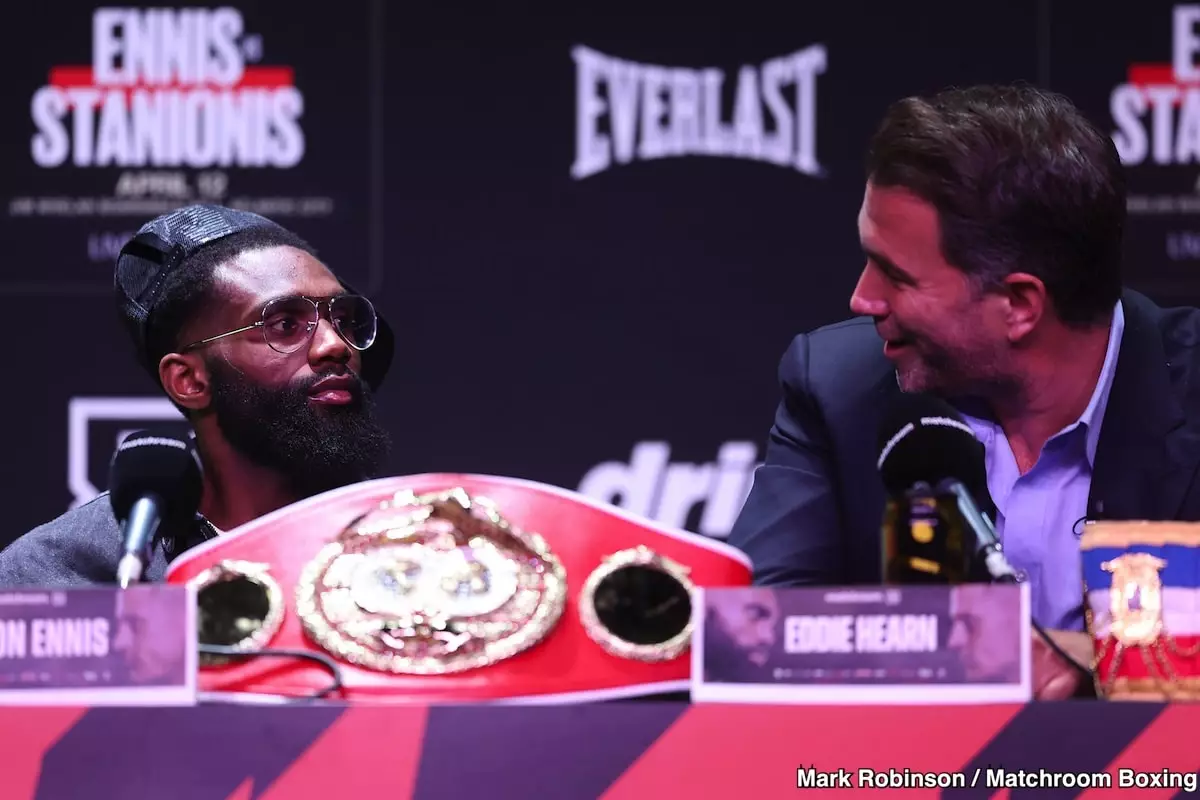In the tumultuous world of boxing, the glare of public scrutiny often falls heavily on fighters, especially when the stakes are high. Currently, Jaron ‚Boots‘ Ennis finds himself nestled uneasily in this spotlight following his decision to decline a lucrative fight against rising star Vergil Ortiz Jr. Instead, he opted to face Eimantas Stanionis, a choice that has ignited a fierce debate among fans and analysts alike. The narrative spun by the public suggests that Ennis, who boasts an impressive record of 33 wins without a loss, is evading a potential showdown with Ortiz, who is seen as a ferocious contender in the welterweight division. But is Ennis truly ducking a challenge, or is there more to the story than meets the eye?
The Financial Gamble
The financial implications of boxing matches are as significant as the physical demands. Rumors circulated that Ennis turned down a career-high payday of around $8 million to sidestep Ortiz. Fans reacted vocally, brandishing terms like „ducking“ to characterize his decision. Yet, this perspective fails to account for the complexity of a professional athlete’s choices. While $8 million is a staggering sum, the context of career longevity, performance dynamics, and personal goals plays a crucial role in a fighter’s decision-making process. Ennis’s promoter, Eddie Hearn, suggested that the fighter simply wanted to remain in the welterweight class, avoiding the physical toll and potential disadvantages that might arise from moving up to 154 pounds. This choice, rather than a sign of cowardice, could instead indicate a strategic approach aimed at career sustainability and dominance in his current weight class.
Understanding the Narrative
Ennis’s reaction to the criticism he has received sheds light on the disconnect between public perception and his reality. The young champion insists that the narrative surrounding his fight choice is built on „miscommunication“ and a misunderstanding of his professional aspirations. He expressed frustration with the rampant speculation spread by podcasters and online commentators, who lack insight into the behind-the-scenes negotiations that determine fight pairings. Such a defense highlights the pervasive issue in contemporary sports media: the tendency to paint complex situations with a broad brush, often reducing the multifaceted realities of an athlete’s career to soundbites and superficial analysis.
A Fighter’s Focus
When pressed about his decision, Ennis maintained that his focus is currently on Stanionis, dismissing the distractions fueled by public opinion. This steadfast mentality is commendable, as it underscores an attribute essential for success: the ability to concentrate on one’s immediate goals despite external pressures. Combat sports require an unwavering mental fortitude, where fighters must hone in on their opponents rather than the noise surrounding them. Ennis’s drive to prioritize his upcoming fight reflects a mature approach to his craft, demonstrating a professional’s commitment to preparation over public perception.
The Broader Implications for Boxing
Ennis’s situation has broader implications for the boxing community, particularly concerning how fighters navigate the need for lucrative fights versus maintaining a positive public image. Many boxers confront similar dilemmas: the desire to build a legacy through meaningful battles versus the immediate temptation of financial gain. Fighters like Ennis stand at a critical juncture: balancing public expectations with personal ambitions in a landscape filled with ever-increasing scrutiny.
In this light, the pressure on athletes to accept high-stakes bouts, regardless of timing or personal readiness, underscores a troubling aspect of modern sports culture. The expectation to conform to fan desires often ignores the intricacies of an athlete’s life and the complex chess game they engage in to secure their futures.
Simplifying Complexity
To label Jaron Ennis as a coward simply oversimplifies a nuanced situation. The term “ducking” evokes images of cowardice and fear, but it lacks the understanding of strategic thinking that professional fighters must embrace. Ennis’s decision reflects a calculated risk rather than a blatant evasion of competition. As boxing continues to evolve, this conversation about priorities—between financial gain, legacy, and fighter safety—will undoubtedly lead to further scrutiny and debate. The question remains: will fans ever be able to appreciate the shades of grey in a sport often defined by black-and-white narratives?


Napsat komentář